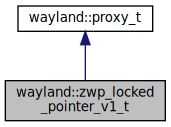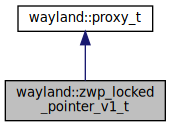receive relative pointer motion events More...
#include <wayland-client-protocol-unstable.hpp>


Public Types | |
| enum | wrapper_type { wrapper_type::standard, wrapper_type::display, wrapper_type::foreign, wrapper_type::proxy_wrapper } |
Public Member Functions | |
| void | set_cursor_position_hint (double surface_x, double surface_y) |
| set the pointer cursor position hint More... | |
| void | set_region (region_t region) |
| set a new lock region More... | |
| std::function< void()> & | on_locked () |
| lock activation event More... | |
| std::function< void()> & | on_unlocked () |
| lock deactivation event More... | |
| uint32_t | get_id () const |
| Get the id of a proxy object. More... | |
| std::string | get_class () const |
| Get the interface name (class) of a proxy object. More... | |
| uint32_t | get_version () const |
| Get the protocol object version of a proxy object. More... | |
| wrapper_type | get_wrapper_type () const |
| Get the type of a proxy object. More... | |
| void | set_queue (event_queue_t queue) |
| Assign a proxy to an event queue. More... | |
| wl_proxy * | c_ptr () const |
| Get a pointer to the underlying C struct. More... | |
| bool | proxy_has_object () const |
| Check whether this wrapper actually wraps an object. More... | |
| operator bool () const | |
| Check whether this wrapper actually wraps an object. More... | |
| bool | operator== (const proxy_t &right) const |
| Check whether two wrappers refer to the same object. More... | |
| bool | operator!= (const proxy_t &right) const |
| Check whether two wrappers refer to different objects. More... | |
| void | proxy_release () |
| Release the wrapped object (if any), making this an empty wrapper. More... | |
Static Public Attributes | |
| static constexpr std::uint32_t | set_cursor_position_hint_since_version = 1 |
| Minimum protocol version required for the set_cursor_position_hint function. More... | |
| static constexpr std::uint32_t | set_region_since_version = 1 |
| Minimum protocol version required for the set_region function. More... | |
Detailed Description
receive relative pointer motion events
The wp_locked_pointer interface represents a locked pointer state.
While the lock of this object is active, the wl_pointer objects of the associated seat will not emit any wl_pointer.motion events.
This object will send the event 'locked' when the lock is activated. Whenever the lock is activated, it is guaranteed that the locked surface will already have received pointer focus and that the pointer will be within the region passed to the request creating this object.
To unlock the pointer, send the destroy request. This will also destroy the wp_locked_pointer object.
If the compositor decides to unlock the pointer the unlocked event is sent. See wp_locked_pointer.unlock for details.
When unlocking, the compositor may warp the cursor position to the set cursor position hint. If it does, it will not result in any relative motion events emitted via wp_relative_pointer.
If the surface the lock was requested on is destroyed and the lock is not yet activated, the wp_locked_pointer object is now defunct and must be destroyed.
Definition at line 2297 of file wayland-client-protocol-unstable.hpp.
Member Enumeration Documentation
◆ wrapper_type
|
stronginherited |
Underlying wl_proxy type and properties of a proxy_t that affect construction, destruction, and event handling
| Enumerator | |
|---|---|
| standard | C pointer is a standard type compatible with wl_proxy*. Events are dispatched and it is destructed when the proxy_t is destructed. User data is set. |
| display | C pointer is a wl_display*. No events are dispatched, wl_display_disconnect is called when the proxy_t is destructed. User data is set. |
| foreign | C pointer is a standard type compatible with wl_proxy*, but another library owns it and it should not be touched in a way that could affect the operation of the other library. No events are dispatched, wl_proxy_destroy is not called when the proxy_t is destructed, user data is not touched. Consequently, there is no reference counting for the proxy_t. Lifetime of such wrappers should preferably be short to minimize the chance that the owning library decides to destroy the wl_proxy. |
| proxy_wrapper | C pointer is a wl_proxy* that was constructed with wl_proxy_create_wrapper. No events are dispatched, wl_proxy_wrapper_destroy is called when the proxy_t is destroyed. Reference counting is active. A reference to the proxy_t creating this proxy wrapper is held to extend its lifetime until after the proxy wrapper is destroyed. |
Definition at line 105 of file wayland-client.hpp.
Member Function Documentation
◆ c_ptr()
|
inherited |
Get a pointer to the underlying C struct.
- Returns
- The underlying wl_proxy wrapped by this proxy_t if it exists, otherwise an exception is thrown
◆ get_class()
|
inherited |
Get the interface name (class) of a proxy object.
- Returns
- The interface name of the object associated with the proxy
◆ get_id()
|
inherited |
◆ get_version()
|
inherited |
Get the protocol object version of a proxy object.
Gets the protocol object version of a proxy object, or 0 if the proxy was created with unversioned API.
A returned value of 0 means that no version information is available, so the caller must make safe assumptions about the object's real version.
display_t will always return version 0.
- Returns
- The protocol object version of the proxy or 0
◆ get_wrapper_type()
|
inlineinherited |
Get the type of a proxy object.
Definition at line 288 of file wayland-client.hpp.
◆ on_locked()
| std::function< void()> & zwp_locked_pointer_v1_t::on_locked | ( | ) |
lock activation event
Notification that the pointer lock of the seat's pointer is activated.
Definition at line 5384 of file wayland-client-protocol-unstable.cpp.
◆ on_unlocked()
| std::function< void()> & zwp_locked_pointer_v1_t::on_unlocked | ( | ) |
lock deactivation event
Notification that the pointer lock of the seat's pointer is no longer active. If this is a oneshot pointer lock (see wp_pointer_constraints.lifetime) this object is now defunct and should be destroyed. If this is a persistent pointer lock (see wp_pointer_constraints.lifetime) this pointer lock may again reactivate in the future.
Definition at line 5389 of file wayland-client-protocol-unstable.cpp.
◆ operator bool()
|
inherited |
Check whether this wrapper actually wraps an object.
- Returns
- true if there is an underlying object, false if this wrapper is empty
◆ operator!=()
|
inherited |
Check whether two wrappers refer to different objects.
◆ operator==()
|
inherited |
Check whether two wrappers refer to the same object.
◆ proxy_has_object()
|
inherited |
Check whether this wrapper actually wraps an object.
- Returns
- true if there is an underlying object, false if this wrapper is empty
◆ proxy_release()
|
inherited |
Release the wrapped object (if any), making this an empty wrapper.
Note that display_t instances cannot be released this way. Attempts to do so are ignored.
- Examples
- foreign_display.cpp.
◆ set_cursor_position_hint()
| void zwp_locked_pointer_v1_t::set_cursor_position_hint | ( | double | surface_x, |
| double | surface_y | ||
| ) |
set the pointer cursor position hint
- Parameters
-
surface_x surface-local x coordinate surface_y surface-local y coordinate
Set the cursor position hint relative to the top left corner of the surface.
If the client is drawing its own cursor, it should update the position hint to the position of its own cursor. A compositor may use this information to warp the pointer upon unlock in order to avoid pointer jumps.
The cursor position hint is double buffered. The new hint will only take effect when the associated surface gets it pending state applied. See wl_surface.commit for details.
Definition at line 5374 of file wayland-client-protocol-unstable.cpp.
◆ set_queue()
|
inherited |
Assign a proxy to an event queue.
- Parameters
-
queue The event queue that will handle this proxy
Assign proxy to event queue. Events coming from proxy will be queued in queue instead of the display's main queue.
See also: display_t::dispatch_queue().
- Examples
- proxy_wrapper.cpp.
◆ set_region()
| void zwp_locked_pointer_v1_t::set_region | ( | region_t | region | ) |
set a new lock region
- Parameters
-
region region of surface
Set a new region used to lock the pointer.
The new lock region is double-buffered. The new lock region will only take effect when the associated surface gets its pending state applied. See wl_surface.commit for details.
For details about the lock region, see wp_locked_pointer.
Definition at line 5379 of file wayland-client-protocol-unstable.cpp.
Member Data Documentation
◆ set_cursor_position_hint_since_version
|
staticconstexpr |
Minimum protocol version required for the set_cursor_position_hint function.
Definition at line 2342 of file wayland-client-protocol-unstable.hpp.
◆ set_region_since_version
|
staticconstexpr |
Minimum protocol version required for the set_region function.
Definition at line 2360 of file wayland-client-protocol-unstable.hpp.
The documentation for this class was generated from the following files:
